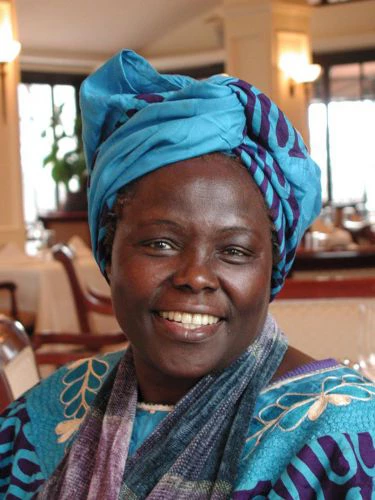I came to the World Bank in 2003 with 25 years developing country experience − but all in Asia. I knew that I needed to quickly become familiar with other parts of the world, particularly Africa. So I went on a 10-day immersion “course” to Kenya, led and managed by Professor Wangari Maathai’s daughter, Wanjira.
I first met Prof. Maathai in one of her District villages − she was serving as a Member of Parliament and Vice Minister of Environment at the time. I was greeted at that first meeting the same way she greeted me in all subsequent meetings −with smiling eyes showing warmth and true joy in meeting me, and her embrace sending a signal of graceful strength. Our friendship was quickly solidified when she asked me where I was from. Kansas, I had said − and she smiled and told me that she had gone to university and received her bachelor’s degree in biology from Kansas!
At that first meeting, she was surrounded by villagers who loved and honored her. I thought that I was going to see trees and hear about the way the Green Belt Movement engages women to replant degraded and denuded hillsides with indigenous tree seedlings which they raise in village nurseries. Of course that was one part of the day but the primary focus of the Professor was on helping the village deal with the struggle against HIV-AIDS.
She had arranged for the construction of a small shelter for villagers suffering from the disease, and perhaps more importantly, was teaching them to grow nutritious food in the adjacent garden that would help give strength to those who could still lead a reasonably productive life. It was a community effort in an already-impoverished community that was hard hit by HIV-AIDS. Her love for the people and theirs in return was evident at every turn and in every place where initiatives were underway to improve the quality of the lives of the villagers, in part by improving the productivity and services of the surrounding ecosystems. Prof. Maathai was thus a pioneer in applying the concept of protecting and restoring ecosystems as a fundamental element of reducing rural poverty.
Over the last few years, the World Bank has become increasingly engaged with the Green Belt Movement. Several of us, including Kathy Sierra when she was VP of Sustainable Development Network at the World Bank, have planted trees under the watchful eye of the Professor. The Bank’s BioCarbon Fund is supporting the Green Belt Movement’s efforts. This initiative has demonstrated the difficulty of marrying a truly grass-roots program like the Green Belt Movement with global players and carbon markets, but Wangari Maathai believed it was possible and important. And to her credit, it is being done!
Professor Wangari Maathai was an exceptional leader, loved by her people. She was someone who was able to bridge the gap from community level to national parliament and to global platforms. She also knew and understood the link between development and environment to provide sage advice to many of us on challenging issues that we face in the Bank. Her autobiography, Unbowed, A Memoir published in 2006 gives a glimpse of the warm, strong leader and thinker that Professor Maathai was. Her death at 71 is a sad loss, but her legacy will live on. Her work will continue to provide ongoing support to her community and country, but also benefit the world and inform the World Bank’s work. My memories of her will live on no matter where I am.



Join the Conversation